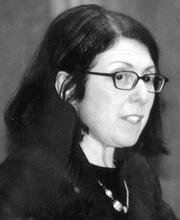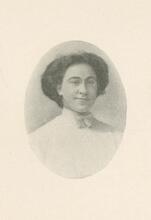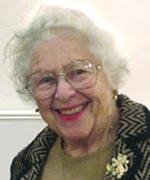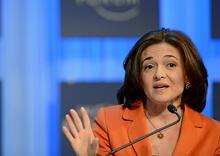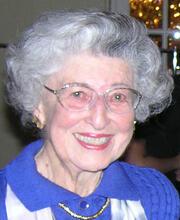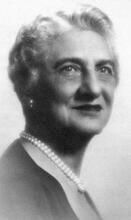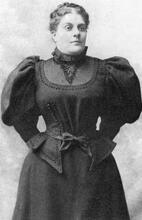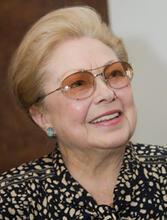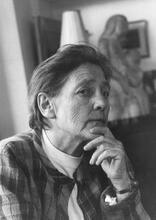Ruth Lewis Farkas
Ruth Lewis Farkas’s remarkable and varied career ranged from retail to teaching to philanthropy. In 1928, Farkas opened a retail store, Alexander’s, which expanded to eleven locations by 1992, and for which she served as vice chair and director of personnel and community relations. Farkas was also president of Dolma Realty in Florida, before studying and teaching sociology. She then became involved in medicine, serving in leadership roles at institutions of psychiatry, children’s health, chronic illnesses, and women’s health. Recognized for her sociological work, Farkas was appointed to a position at UNESCO and the American delegation of the International Conference on Eradication of Illiteracy. She focused her later career on philanthropy and gender studies, through the Role Foundation, which she founded in 1967.
The impressive and full life of Ruth Lewis Farkas spanned many occupations: educator, sociologist, businesswoman, philanthropist, inventor, wife, and mother. She was born on December 20, 1906, and raised in Manhattan, the fourth of Samuel Lewis and Jennie Bach’s five children. Farkas’s parents were in the real estate business, but Jennie Lewis also worked with the poor of Manhattan and occasionally allowed her young daughter to accompany her into tenements. She gave Ruth this advice: “No matter what your station in life, always try to contribute to those less fortunate.”
Early life: marriage, education, retail
Ruth Lewis married her childhood neighbor George Farkas after a long courtship. George proposed to Ruth in her first year of college, but her mother insisted she complete her studies. A Founder’s Day Scholar, Ruth received her bachelor’s degree from New York University and married George three weeks later on June 7, 1928. Farkas went on to obtain a master’s degree in sociology from Columbia in 1932, and a Ph.D. from New York University in 1958. During these years, the couple raised four sons: Alexander (b. 1930), Robin (b. 1933), Bruce (b. 1938), and Jonathan (b. 1948). Always the innovator, Farkas patented the “roller muff,” which fit around the handlebars of strollers and kept mothers’ hands and nursing bottles warm. The muff could also be taken from the handlebars and worn around the hands during cold weather.
The year 1928 brought the founding of Alexander’s, a New York retail chain, renowned for its discount merchandise and named for George Farkas’s deceased father. The first Alexander’s opened in the Bronx, grossing $500,000 in 1929, and expanded to eleven locations by 1992. Farkas was the vice chairperson and personnel and community relations director, from 1955 to 1972.
Long and varied career
Farkas compiled a long list of accomplishments during her lifetime: psychological tutor with the Federation of Jewish Charities (1941–1945), educational sociology instructor at New York University (1945–1955), and president of the Dolma Realty Corporation of Fort Lauderdale, Florida (1955–1972). In 1962, she became the director of the William Alanson White Institute of Psychiatry, and in 1966 she was appointed the chair of the President’s Advisory Council of the New York University Graduate School of Social Work. In addition to these chairs, she was Women’s Division Chairman of the Albert Einstein Medical College, president of the Beth Abraham Hospital for the Chronic Ill, and vice president of the Child Study Association of America.
Her leadership roles in educational sociology brought her to the attention of Secretary of State Dean Rusk in 1964, who appointed her to a three-year nonpaying position with UNESCO and made her adviser to the American delegation to the International Conference on Eradication of Illiteracy, held in Iran in 1965. As a sociologist, Farkas conducted research in the area of male-female behavior and perceptions at the Role Foundation, which she organized in 1967. In 1965, Farkas became the first alumna and the third woman to be named to the board of trustees of New York University since its establishment in 1831.
Controversy and legacy
The latter part of Farkas’s life involved some controversy. A lifelong Republican, Farkas and her family supported President Richard M. Nixon in his reelection campaign, donating more than $300,000. Farkas was then appointed ambassador to Luxembourg in 1973. In July of 1974, Nixon’s lawyer and fund-raiser Herbert Kalmbach testified before the House Judiciary Committee that Farkas knew her donation would lead to an ambassadorial posting. Farkas denied the charges, and her Senate confirmation was delayed. Prevailing on the strength of her remarkable background, Farkas used her post for philanthropic pursuits.
Farkas continued her contributions to the less fortunate. An active member of the Jewish community, Farkas was awarded the Louise Waterman Wise Distinguished Service Award in 1966 for leadership in welfare and educational causes. Upon her death, she was hailed as a determined force in social welfare causes and as a friend, mentor, and counselor to many. Her life demonstrated the possibilities that exist for a woman of determination, intelligence, and education.
After a short stay in a Manhattan hospital for a heart ailment, Ruth Lewis Farkas was released and died at the home of her son Robin on October 18, 1996, at age eighty-nine
Cheshire, Maxine. “A Lady for Luxembourg.” New York Daily News, March 1, 1973, 54.
“Cost of Costa Rica.” New Republic 161 (August 31, 1974): 10.
EJ (1973–1982).
Farkas, Ruth Lewis. Biography File. New York University and New York University Medical School Archives.
Knight, Michael. “Sociologist, Trustee, Envoy: Ruth Lewis Farkas.” NYTimes, February 28, 1973, A15.
Leavitt, Judith A. American Women Managers and Administrators: A Selective Biographical Dictionary of Twentieth-Century Leaders in Business, Education, and Government (1985).
Leibowitz, Ed. “Recalling Alexander’s: Discount Store with Million-Dollar Memories.” New York Newsday, August 20, 1992, 47.
Pincus, W. “Case of Peter Flanigan.” New Republic 171 (October 19, 1984): 12–13.
Silverman, Edward R. “Up for Grabs: Alexander’s Collapse Creates Opportunity for a Successor, and a Potential Disaster for the Bronx and its Merchants.” New York Newsday, June 22, 1992, 25.
Sloan, Allan. “Looking Closer at the Odd Bankruptcy of Alexander’s Inc.” Washington Post, June 2, 1992, C3.
Strom, Stephanie. “Alexander’s Shuts All Its Eleven Stores: Plans Liquidation.” NYTimes, March 16, 1992, sec. 1, p. 1.
U.S. Congress, House. Dr. “Dynamo.” Extension of Remarks of Hon. Jonathan B. Bingham of New York. 90th Cong., 1st sess. Congressional Record (November 9, 1967), vol. 113.
U.S. Department of State. Biographic Register (1974).
Van Gelder, Lawrence, “Ruth Farkas, Nixon’s Ambassador to Luxembourg, Dies.” NYTimes, October 18, 1996, D25.
Who’s Who in America, 1992–1993. 47th ed. (1992).
Who’s Who in the World: 1978–1979. 4th ed. (1978).


